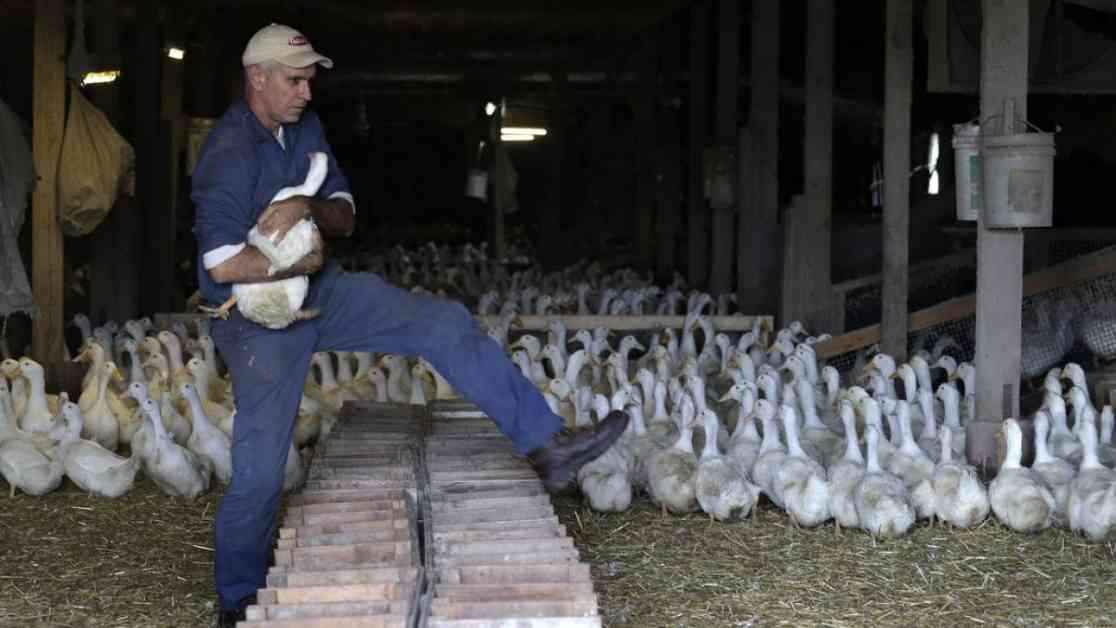Long Island Duck Farm Faces Bird Flu Crisis, 10,000 Birds Culled
In a devastating blow to the last commercial duck farm on Long Island, Crescent Duck Farm in Aquebogue, New York, has been forced to cull approximately 10,000 birds due to an avian flu outbreak. The farm, owned by the Corwin family since the 1640s, has been a staple of the region’s agricultural landscape for generations. This outbreak not only threatens the livelihood of the farm but also raises concerns about the future of duck production in the area.
The Impact on Crescent Duck Farm
Doug Corwin, the 66-year-old owner of Crescent Duck Farm, expressed his shock and sadness at the situation. Following the culling of the birds, the farm has been placed under quarantine, and the remaining staff is working tirelessly to sanitize the facility. With a history dating back to 1908, the farm now faces an uncertain future as it grapples with the aftermath of the outbreak.
Corwin’s personal connection to the farm and its longstanding legacy is evident as he reflects on the implications of the outbreak. The farm, which once employed 75 workers, has been forced to lay off 47 employees due to the financial impact of the crisis. Corwin’s candid admission that he is unsure of the farm’s future if duck farming is no longer viable highlights the gravity of the situation.
Long Island’s Duck Farming Legacy
Long Island has a rich history of duck production, dating back to its heyday in the early 1960s when the region was a hub of duck farming in the U.S. With over 100 farms producing millions of birds annually, Long Island played a significant role in the nation’s duck output. However, the decline of duck farming in the region over the years has left Crescent Duck Farm as the last remaining operation, facing numerous challenges.
Corwin’s emphasis on the farm’s commitment to producing high-quality ducks that set them apart from competitors underscores the farm’s dedication to preserving its unique legacy. Despite the setbacks caused by the outbreak, Corwin remains hopeful that the farm can rebuild its flock using the remaining duck eggs and continue its tradition of supplying top-tier restaurants with premium duck meat.
The Need for Vaccination and Biosecurity Measures
As Crescent Duck Farm navigates the aftermath of the outbreak, Corwin emphasizes the importance of federal approval for vaccinating poultry to prevent future incidents. Larger industrial farms oppose vaccination due to its impact on international sales, leaving smaller operations vulnerable to similar crises. The farm’s meticulous biosecurity protocols were unable to prevent the virus from infiltrating the facility, highlighting the ongoing challenges of combating avian flu.
Despite the rarity of human cases of bird flu, the economic implications of outbreaks in commercial flocks are significant. With millions of birds infected in recent months and farms across the country being affected daily, the need for robust biosecurity measures and vaccination protocols is more pressing than ever. Corwin’s acknowledgment of the farm’s shortcomings in preventing the outbreak serves as a cautionary tale for the industry at large.
Looking Ahead
As Crescent Duck Farm grapples with the aftermath of the bird flu outbreak, the future of duck farming on Long Island hangs in the balance. Corwin’s resilience in the face of adversity and his commitment to preserving the farm’s legacy are a testament to the indomitable spirit of agricultural communities. The road ahead may be uncertain, but the Corwin family’s dedication to overcoming challenges and adapting to changing circumstances offers hope for a brighter future for the last remaining duck farm on Long Island.












